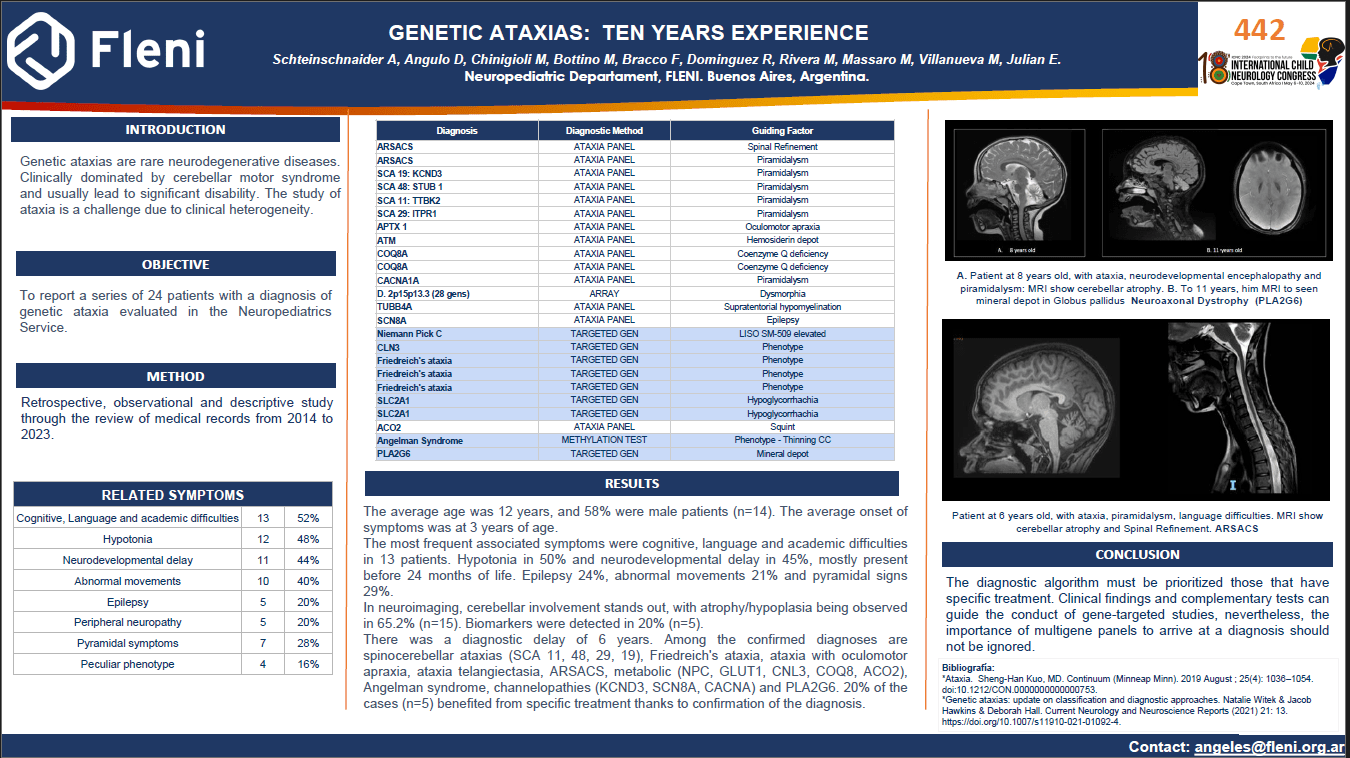GENETIC ATAXIAS: TEN YEARS EXPERIENCE
INTRODUCTION Genetic ataxias are rare neurodegenerative diseases. Clinically dominated by cerebellar motor syndrome and usually lead to significant disability. The study of ataxia is a challenge due to clinical heterogeneity.
OBJECTIVES To report a series of 24 patients with a diagnosis of genetic ataxia evaluated in the Neuropediatrics Service.
MATERIALS AND METHODS Retrospective, observational and descriptive study through the review of medical records from 2014 to 2023.
RESULTS The average age was 12 years, and 58% were male patients (n=14). The average onset of symptoms was at 3 years of age. The most frequent associated symptoms were cognitive, language and academic difficulties in 13 patients. Hypotonia in 50% and neurodevelopmental delay in 45%, mostly present before 24 months of life. Epilepsy 24%, abnormal movements 21% and pyramidal signs 29%. In neuroimaging, cerebellar involvement stands out, with atrophy/hypoplasia being observed in 65.2% (n=15). Biomarkers were detected in 20% (n=5). There was a diagnostic delay of 6 years. Among the confirmed diagnoses are spinocerebellar ataxias (SCA 11, 17, 29, 19), Friederich's ataxia, ataxia with oculomotor apraxia, ataxia telangiectasia, ARSACS, metabolic (NPC, GLUT1, CNL3, COQ8, ACO2), Angelman syndrome, channelopathies (KCND3, SCN8A, CACNA) and PLA2G6. 20% of the cases (n=5) benefited from specific treatment thanks to confirmation of the diagnosis.
CONCLUSIONS The diagnostic algorithm must prioritized those that have specific treatment. Clinical findings and complementary tests can guide the conduct of gene-targeted studies, nevertheless, the importance of multigene panels to arrive at a diagnosis should not be ignored.
Diana Angulo
Rául Carrea Institute for Neurological Research- FLENI-
Argentina
Micaela Chinigioli
Rául Carrea Institute for Neurological Research- FLENI-
Argentina
Marina Bottino
Rául Carrea Institute for Neurological Research- FLENI-
Argentina
Maria Florencia Bracco
Rául Carrea Institute for Neurological Research- FLENI-
Argentina
Romina Dominguez
Rául Carrea Institute for Neurological Research- FLENI-
Argentina
Manuel Rivera
Rául Carrea Institute for Neurological Research- FLENI-
Argentina
Eliana Julian
Rául Carrea Institute for Neurological Research- FLENI-
Argentina
Mercedes Villanueva
Rául Carrea Institute for Neurological Research- FLENI-
Argentina
Mario Massaro
Rául Carrea Institute for Neurological Research- FLENI-
Argentina
Angeles Scheteinschnaider
Rául Carrea Institute for Neurological Research- FLENI-
Argentina

Angeles Scheteinschnaider
Rául Carrea Institute for Neurological Research- FLENI-
Argentina